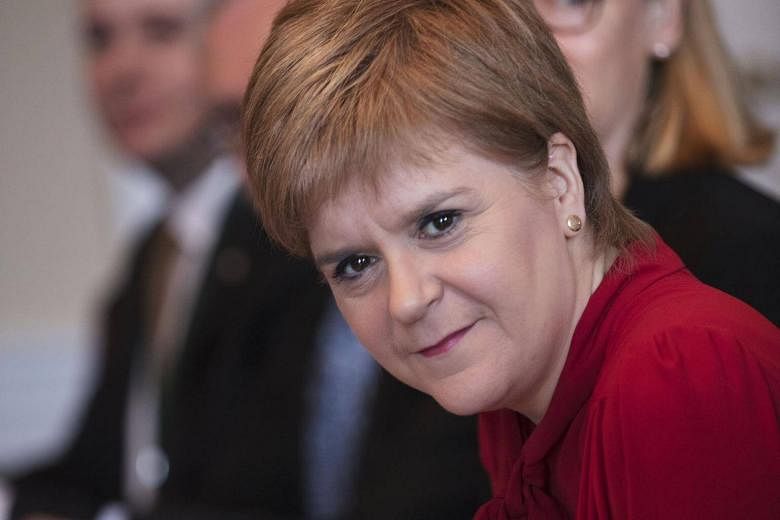British Prime Minister Theresa May has slammed calls by Scotland's autonomous government for a new independence referendum as divisive and likely to "cause huge economic uncertainty" just as Britain is about to embark on negotiations to withdraw from the European Union.
Scottish leader Nicola Sturgeon's announcement that she will be seeking another referendum to decide "the kind of country Scotland will become" is already creating havoc with the schedule of negotiations for Brexit, as Britain's departure from the EU is known.
And fears of her country's break-up are fast becoming one of the biggest factors in Mrs May's negotiations with the rest of Europe.
While voters decisively rejected the option of independence in a 2014 referendum, the separatists have never accepted defeat.
Support for the Scottish National Party (SNP), the pro-independence movement, has soared; the SNP dominates Scotland's government and is Britain's third-largest political force.
But the biggest boost to Scotland's nationalists came last June, when the people of Britain voted to leave the EU. The result was a narrow one; only 51.8 per cent opted for Brexit. In Scotland, however, two-thirds of the population expressed its continued support for the EU.
Ms Sturgeon, who runs the Scottish government, vows that Scotland will not allow itself to be "pushed out" of the EU.
She first demanded that Mrs May negotiate for Scotland a "special access" status in Europe once Britain leaves the EU. The wily Scottish politician knew all along that this was an impossibility because, as part of the United Kingdom, Scotland cannot get any special EU status.
But that was precisely the point Ms Sturgeon wanted to make. After claiming that she had given Mrs May "every opportunity to compromise", Ms Sturgeon now proposes to call another independence referendum. "Whatever path we take, it should be decided by us, not for us," she thundered in her Monday rallying cry to nationalists.
In theory, Ms Sturgeon's announcement changes nothing; only the British Parliament can authorise a referendum. Nor are opinion polls favourable to the nationalists. Although the latest surveys suggest that the margin between those favouring independence and those in support of remaining part of the United Kingdom is narrowing, very few polls predict a victory for the nationalists.
Nevertheless, by throwing down the gauntlet, Ms Sturgeon calculates that she cannot lose. If Mrs May refuses a referendum, that could be used to galvanise nationalist opinion in favour of independence.
But if Mrs May accepts another independence ballot, she will open herself to constant blackmail from Scotland: Literally any Brexit deal the British government negotiates can be dismissed by Ms Sturgeon as inferior to what an independent Scotland would, supposedly, be able to get on its own.
Ms Sturgeon's referendum announcement has already derailed the Prime Minister's plans to announce the start of the Brexit negotiations this week, and that in itself underscores Scotland's centrality in British politics.
Still, the Scottish leader has her own problems. Her government has wrested from London powers to vary both taxes and expenditure. What happens to the Scottish economy can therefore no longer be blamed on politicians in London. And the Scottish economy is ailing: Battered by low oil prices and big social spending liabilities, Scotland is currently worse off than the rest of Britain by almost every yardstick.
The previous independence referendum was lost because the SNP was unable to persuade Scots that they would not be economically worse off outside Britain. But in a future referendum, that task would be even harder since, without Britain, the Scots will have to ditch the British pound and adopt the euro the moment they leave Britain.
They will also have to apply to join the EU and wait to be admitted. The idea that Scotland would seamlessly remain in the EU while the rest of Britain leaves the Union has been ruled out by senior EU officials and governments.
Mrs May hopes that if she succeeds in drawing out the referendum debate until 2019, when the Brexit negotiations should be over, ordinary Scots would tire of their nationalists' agenda. But Ms Sturgeon is betting that the nationalist drumbeat will keep her in power.
Yet, the more vulnerable of the two women who now dominate British life is undoubtedly Mrs May, who faces the unenviable task of arguing in the same breath that it is good for Britain to leave the EU, but it would be bad for Scotland to break away from the United Kingdom.


